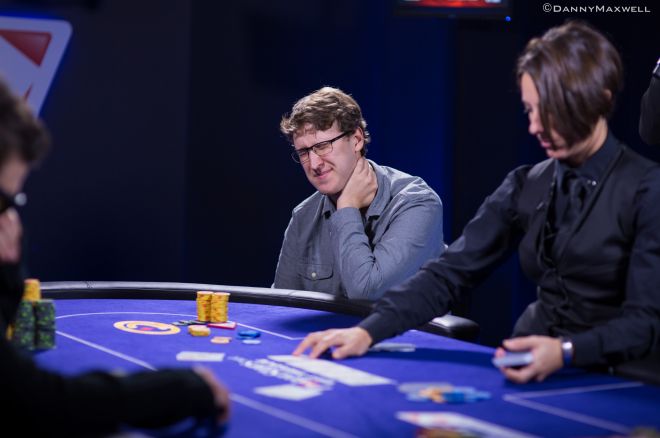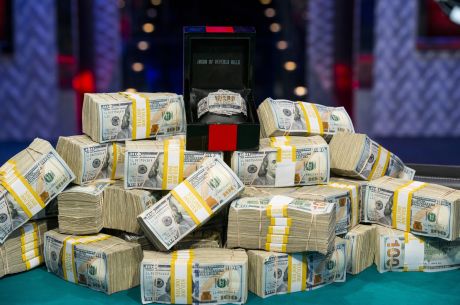"Investing" in Your Game: TradingHD on Risk Management in Poker

A commonly shared piece of poker wisdom encourages players not to become overly concerned about short-term results and instead to focus on the long term as much more meaningful when it comes to assessing how you are performing.
That’s often easier said than done, to be sure. But most who take the game seriously at least agree in principle to such advice. It makes logical sense not to put too much meaning into the result of a given session or single tournament. It also helps us keep a level head and remain psychologically strong in the face of adversity.
Many poker players like to “think big” and dream of hitting a huge score. But winning poker players almost without exception also “think big picture,” taking the long view rather than live or die with every hand.
Earlier in this series we were discussing how for many players, thinking long term is made even more difficult thanks to the fact that they don’t put in the same volume as full-timers or professionals. If you’re only playing a handful of tournaments a year or one cash game every week or two, it’s hard not to get caught up in the results of what are truthfully only small sample sizes.
Even so, just because we aren’t going to play hundreds of tournaments a year or hundreds of thousands of hands in cash games, that doesn’t mean we still can’t adopt many of the same smart practices of those who do. Don’t use the excuse that since you won’t be playing again for another couple of weeks it’s okay to increase your risk-taking when you do play — by playing too many hands, at higher stakes, or in other ways.
Drawing once more from TradingHD contributor Lex van Dam’s advice to investors — this time from his article on Risk Management — that mistake of indulging in risks unnecessarily is common both to losing poker players and to unprofitable investors. As van Dam points out, those newer to buying and selling and stocks (just like newer poker players) are especially prone to taking unnecessary risks, sometimes without even realizing that they are.
“The reason where most new traders go wrong is by taking too much risk,” explains van Dam. “There is a saying that there are old traders, and bold traders, but no old bold traders. This means that if you want to survive and trade for the long run, you need to control your risk.”
From there van Dam discusses the topics of margin and leverage and how both work in the context of investing. While that discussion can be related to poker, it is perhaps somewhat beyond the scope of most of us for whom bankroll management doesn’t involve borrowing funds with which to play.
Even so, the discussion highlights other ideas related to managing risk that obviously apply to all poker players, be they recreational part-timers or full-time pros. For example...
“Never speculate with money you cannot afford to lose.”
It’s a fundamental principle of sound bankroll management — in trading and in poker — to sort out beforehand how much we actually can afford to risk before seeking to earn rewards.
“It is a very common mistake to try and make up for losses as soon as possible, but unfortunately rushing and trading do not go together.”
Here the advice has to do with showing patience as an investor and being able to wait for the right price before buying and selling. “Wait for the market to come to you,” says van Dam.
In poker we might talk in similar terms about not letting the loss of one big pot encourage us to play recklessly in the hopes of winning the next one. Or about not hopping right back into another tournament after busting one, or joining a higher-stakes cash game after getting stacked in a lower-stakes one.
“Another tip for controlling your risk is to run your portfolio at such a level that you can still sleep at night.”
This is where an investor has to be careful to avoid getting in so deep it affects the ability to remain rational, not to mention to be able to relax when not trading.
It’s similarly crucial in poker not to put yourself in spots where your “risk of ruin” is high enough to affect your mental fortitude. Everyone has his or her own personal threshold for being able to withstand risk. Knowing your own limits in this regard can help you control your risk-taking, which in turn will help you increase your chance of success long term.
Find out more about risk management as well as other relevant advice to investors and poker players at TradingHD.
Want to stay atop all the latest in the poker world? If so, make sure to get PokerNews updates on your social media outlets. Follow us on Twitter and find us on both Facebook and Google+!
In this Series
- 1 "Investing" In Your Game: Applying TradingHD's Timing Tips To Your Poker Game
- 2 "Investing" In Your Game: TradingHD's Advice for Developing Your Poker Mind
- 3 "Investing" in Your Game: Considering the Psychology of Risk in Poker with TradingHD
- 4 "Investing" in Your Game: TradingHD on Risk Management in Poker
- 5 "Investing" in Your Game: TradingHD on Acting With Deliberation in Poker









